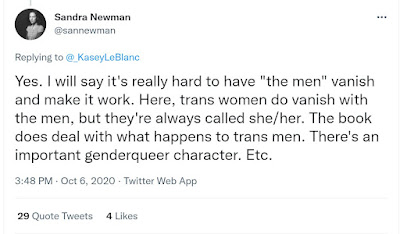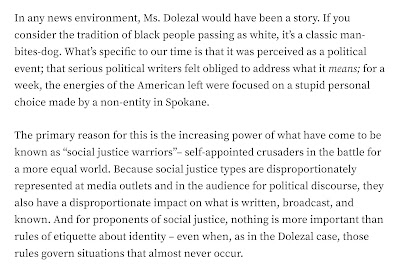INTRODUCTION
An upcoming book, The Men by Sandra Newman*, was announced on Twitter in March 2022. The book was characterized as what I have sometimes called a "Gender Plague" or "Gender Rapture" and which TV Tropes calls "Gendercide". [*Note: Sandra has stated in the wake of her announcement that she is gender nonbinary, but nonbinary people can use any pronouns we want and do not default immediately to they/them, contrary to popular belief! Since I cannot find anywhere where she has provided pronouns other than she/her, I will be using she/her to refer to Sandra throughout this deconstruction until she indicates otherwise.]
Sandra stated in her announcement tweet that "Everyone with a Y chromosome suddenly, mysteriously disappears. In the months that follow, the world gets better: safer, kinder, more egalitarian. But the book is about women who can't let go of the men they've lost, and devote their lives to getting them back."
Members of the trans community pointed out that there are known issues of transphobia and transmisogyny with "Gendercide" premises, which have been hashed out at length during the last few recent publishing of similar books; I myself have extensively talked about the problems with Stephen King's Sleeping Beauties and Lauren Beukes' Afterland. I have also critiqued marketing for Y The Last Man and Femlandia.
"Gendercide" settings tend to lump trans women in with cis men, trans men with cis women, and disappear nonbinary people and intersex people. Sandra's announcement is a perfect example of these problems: the book is titled "The Men" for the disappeared (which, if based merely on the presence of a Y chromosome, would include trans women as well as some intersex and cis women) and the book description talks about the "women" left behind (which, if again based on the absence of a Y chromosome, would include trans men as well as some intersex and cis men). Sandra pushed back against these criticisms, however, insisting that:
- "The book is set in a world like ours, not a world where trans people don't exist. Trans people totally exist and matter in this book."
- "I will say it's really hard to have 'the men' vanish and make it work. Here, trans women do vanish with the men, but they're always called she/her. The book does deal with what happens to trans men. There's an important genderqueer character. Etc."
- "I am nonbinary and I have written a book against gender binaries."
Trans community members expressed concern that Sandra might not fully understand transness, having previously been on record tweeting that "we are all a little trans" because of "artificial hormones"--which is not what transness is nor how it works. Nevertheless, big-name authors joined the fray, with Lauren Hough touting the book as "fucking good" and accusing critics of being a "piece of shit...and dumb as fuck". Lauren was clearly aware of the nature of the criticism, saying "Sandra Newman's book is being attacked as transphobic and also man hating by people who haven't read it and never would." Jennifer Taub, in response to this, announced "I will preorder it then". (I have since learned that Lauren is thanked by name in the acknowledgments of The Men.)
Cis authors urged trans critics to wait until the book was out, read it, and see if their minds were changed. When Black people pointed out that Sandra's previous "plague" novel, The Country of Ice Cream Star, was written in a racist patois that Sandra admitted she'd adapted from AAVE, their concerns were similarly dismissed.
Others pointed out that Sandra has a reputation for publishing articles calling "Social Justice Warriors" "pathetic" and "hysterical" and for characterizing the critics of Rachel Dolezal, the white NAACP official who falsely represented herself as black, as trying to set down "rules of etiquette about identity".
Sandra wrote: "As defined by this new breed of progressives, social justice is almost exclusively about gender, sexual orientation, and race. It's not about economics. It's not about labor law or voting rights or equality. ...social justice warriors will actually work to silence their own supporters. Put simply, the word “ally” is only used to tell people how they're doing it wrong." Most relevant of all to her ability to write trans characters with sensitivity was her statement that: "As violence against transgender people is common, trans activists focus political energy on the introduction of gender-neutral pronouns like ze and hir. "
Because I have a history of critiquing "Gendercide" novels, I put out a call for anyone with an advance review copy to send me one if willing; I also visited the unusual ARC sites and put in a request for the novel directly to the publisher. Within 48 hours, I had a copy in my hands and was ready to read. I promised: "Though I expect the book to be problematic and I have no pretensions to neutrality, I plan to be as fair as I possibly can. I am also a perisex nonbinary transmasc person and not the best person to call out transmisogyny or intersexphobia, but I will do my best."
These are the results of that read. I will cover the novel in themes and parts first and then, if I have the remaining capacity, I will go over a chronological line-by-line reading of problems. I expect this deconstruction to take several days and may occur in several parts. I would ask that no one tag the author into this read. Authors should not be tagged into critique.








![If you see another author being being [sic] piled-on on this fucking website, yet again, and you choose to join in for a few likes and a little clout, you're a piece of shit. And dumb as fuck if you think it can't/won't happen to you.](https://blogger.googleusercontent.com/img/a/AVvXsEgKSmmYWTubSxSamNsZzLuGNH7Sq27eDnlq3KAj7IW_VqBG-JoLIF0Rhl5waSvCx11XSMNC779iUMS9STVRiDrPxI6bm9EvOKIWHFs_7s04KUGvEGIyR7KF7JFvmAQlIYbNHQeKXZQBkrvtuR1WMA7k78euGKOCuyC-EVpUNqJ0MSAIz3-gcjldltgMNw=w400-h151)













0 comments:
Post a Comment